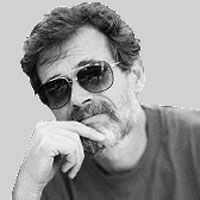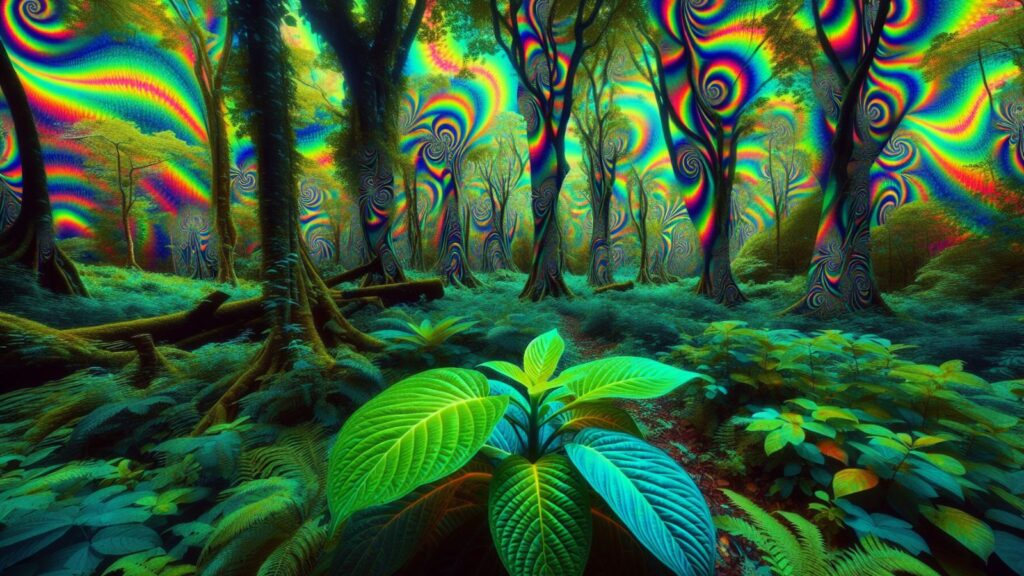The first time that I knew I needed a psychedelic mentor I was sitting under the stars in the Porcupine Mountains of Northern Michigan, on the banks of Lake Superior. My buddy and I began experimenting with psychedelics only months before our backpacking trip. It was late spring, and we decided it would be correct to take a psychedelic journey into the wilderness.
Frustrated by rainy weather, my buddy tried to build our camp fire like a warrior after I had given up. While he fought wet wood and inclimate conditions, I swallowed a capsule of Alexander Shulgin’s beloved 2CT7 (a synthetic cousin of mescalin). My buddy scolded me, “We need a fire to guide us through the night. You’ll be happy I built this in about 2 hours when you’re tripping your balls off.” I scoffed at him and bundled into damp blankets on the ground, looking up at the stars.
An hour later the stars were exploding and the ceiling of heaven was descending like a fog. The trees were dancing. I watched my buddy’s face melt into memories of every moment we ever disliked each other since we were kids. All the competition, jealousy, greed, envy, and bitterness was in front of me as I watched him fanning the flames of a dying camp fire.
I felt afraid that I was truly alone in the Universe.
And almost simultaneously he turned to me and said, only by a look on his face, “You okay? Don’t worry buddy. I’ll have this thing going in a second.”
Isn’t it funny how things are said without being said, all of the time?
Within minutes the fire was magically roaring and my buddy swallowed a capsule and soon joined me in Wonderland.
Near the light of the fire, our story that night was not our own. Instead we visited the story of brotherhood and fear and safety next to small fires, fanned and protected throughout the night, lost in the deep forest.
Fierce eyes peered at me from the forest. Cackling sounds. Crashing trees in the distance. Green lights from the earth. Twinkling. Fangs from the tree tops. And the tide of Superior hissed cold and dead. The breeze taunted me into feeling tiny. Nature was ten times bigger than me. The universe was infinite, and I huddled next to the safety of the fire.
I will never forget that night for as long as I live.
After packing camp the next morning, we drove home. And on the car ride home I remember that we barely spoke. Nevertheless, I’m sure we felt the same things about nature, in its tooth and nail, and about the frontiers of our mind, in its riddles and paradox. We were both thinking something like, “These psychedelics open wild frontiers. We’re going to need training and guidance if we keep doing this.”
Upon arriving home both of us, within months, without coordinating our efforts, had found our way to the teachings of Terence McKenna. In a matter of 70 committed audio lecture hours, like a page turner you can’t put down, I had found not only the one true hero of my contemporary vision questing but the most charming and charismatic intellect of my academic career. (After several graduate degrees I can still say that Terence McKenna is perhaps one of the most underappreciated intellectuals of our time. He was truly a rare gift.)
It is then with a great deal of reverence for the role he has played in my life as a remote mentor that I share the story of how I learned to see Terence fully over the years, not as the perfect High Planes Drifter of psychedelics, as the perfect psychonaut, but as a wounded storyteller like me, as a searching soul like me, and more than anything, a fellow traveler, like each one of us.
I would like to humbly submit my vision story of how Terence came to me during an Ayahuasca ceremony in Peru and told me our relationship as teacher and student had come to completion. In fond memory of him and all he still teaches, I call my Mckenna Ayahuasca vision, “The Wounded Male Geek Vision.”
****
It was my second trip to Iquitos Peru to drink Ayahuasca. The Southern Cross hung in the sky like an omen of safety and strength. The moon was like a silver tear dish just beyond the stratosphere. The directions were called into the mesa, a conch shell was blown in memory of the eldest teacher of the lineage, deceased, and invocation Icaros were sung to welcome the medicine spirits.
After I drank my cup of Ayahuasca and lay onto my sleeping pad, I began to drift in and out of my body like the warm tide of a fresh water lake. Unlike many ceremonies where I am immediately taken into cosmic visions of my existential fear, my Christian wounds, or a primitive fear of death, I began to look back and reflect upon the journey that led me to Peru and Ayahuasca.
I first saw myself in a Chicago apartment eating mushrooms and staring into a candle for hours and hours, realizing how much love I had in my heart. Then I saw myself taking acid in a lakeside park and feeling alive for the first time since childhood. Then next to Lake Superior with my best friend, and the campfire, and eternity, and seeing my primitive fear of nature for the first time. Then I saw myself listening to hundreds upon hundreds of hours of Terence McKenna and trying dozens of different psychedelics.
In the mesa, I heard Terence’s voice in clips and phrases trickling across grids of geometry and sacred monolithic structures: temples, golden ziggurats, mighty pyramids, and star castles. Then I began to hear his voice making fun of the government, saying “culture is not your friend.” I remembered hearing him saying, “Dusting around the ashram is hooey.”
One by one, I began to hear all the little moments where Terence’s channeling of intellectual energy seemed imbued with resentment for authority figures and spiritual tradition. And not just the authority figures he had a reason to be upset by, the imperialistic, prejudicial, and dark energies of materialistic, consumer culture, but also authority figures I could not see, personal stories of pain he did not share in his lectures.
Then I began to hear moments where Terence advocated a pioneering spirit that had not worked for me. Upon Terence’s “heroic dose” recommendation, for example, I had once overdosed myself and suffered from an entire week of extreme paranoia, fear, and dissociation. My parents rightly feared for my mental health when I called them in the middle of the night afraid I was dying.
I found myself chasing demons into my bedroom closet with my bare fists during the night, sprinting out of bed and hurling myself against the walls while sleeping, and waking up confused and without an understanding of what was happening to me.
In each moment of my unfolding McKenna Ayahuasca vision, I saw a positive followed by a negative. For example, I saw myself learning about novelty theory (one of Terence’s most eloquent ideas), and then I saw myself combining a McKenna inspired cocktail of psychedelics that caused me to attack a close friend on my porch. I saw myself journeying to the Amazon, like Terence, but I found myself suffering because of my cynicism regarding shamanic guidance. I resisted asking for help during ceremonies when I needed it because I would repeat head strong things I imagined Terence might have said, “I prefer to drink Ayahuasca alone. These shamans are hokem. I’m going to brew my own later and pioneer the infinite without all this hooey.”
My admiration of Terence McKenna had a dark side that was being revealed to me.
Then in the mesa I saw Terence’s face floating above me, shivering in the rafters of the lodge, morphing and changing alongside the plethora of diverse ways in which I had both learned from him and foolishly emulated his bravado, doing serious damage to my psyche, damage I was healing by my work in a traditional ceremony.
At this very point in the ceremony, one of the English-speaking shamans said to me, “Being brave is good. But it’s not weak to ask for help, either. Sometimes we mistake rebellion and resentment for individuality. Tradition isn’t always bad. It can be supportive and helpful.”
In that moment I realized, as Terence’s face floated above me in the mesa, that I had always wanted Terence to say some things to me that he hadn’t ever said in his lectures, things I perhaps shouldn’t have expected from him.
Things like: “It’s ok to be spiritual. It can be a great thing to have a personal and human relationship to the divine. We all need healing and love. I believe in love. It’s ok to be afraid. I’m afraid too. Guidance works for some people and it’s really important to have some if you think you could benefit from it. I don’t know everything. In fact, for all my talk, I was more impressed than ever to find out what I didn’t know after I passed away.”
For whatever reason, as I imagined him saying these things, I found his face above me echoing each sentiment. My projections of what I wanted McKenna to be for me were there in front of my face, as if he were really saying them.
I began to cry when I realized that I, perhaps unfairly, wanted Terence McKenna to be my father or protector.
Then I began to see visions of myself writing passive-aggressive emails on the internet and inside of chat rooms and blogs. I began to see myself playing the psychedelic pioneer with all of the right answers and the smartest brain. I saw myself reciting Terence’s ideas about psychedelics and the nature of non-linear time to people at parties. I saw myself emulating Terence with psychedelics in an attempt to be brave.
But what I craved more than ever was for Terence to hug me and tell me that I was smart too, just like him. As geeky as it might sound, I wanted Terence McKenna to heal me and love me and show me the ropes. In truth, that’s how cool I thought he was. After listening to his lectures, I wanted him to hug me and give me practical advice about my sadness and fear, about my existential anxiety. I wanted him to have all of the answers for me, personally.
At this moment in my vision, Terence’s face came closer to mine, down from the rafters and right up close to my nose. I could feel his love, as if Terence McKenna were really there and not just an image or “ayahuasca vision.”
It was as if Terence was in the Ayahuasca ceremony with me, and suddenly I felt showered by love. Then I heard him say, without speaking, without words, with just the look on his face floating in the ceiling, “Adam. We’re not so dissimilar. You’re doing fine so far for a young man. Trust yourself. That’s the most important thing I could teach you spiritually. I had my demons too. I learned so much here and was so happy to be human for a time, find all kinds of teachers and grow and love. This is a teaching from me to you. I’m honored you would look up to me so much.”
I cried from my stomach up through my chest and throat and eyes and ears and head trembled.
Even if it was just my own imagination, I knew that Terence was just like me. I knew that Terence needed love, just like me. I realized that I didn’t need to emulate anybody, and I didn’t need any special quality of bravado or intellectual righteousness, especially not in emulation of Terence. It’s as if he was right there telling me,
“Don’t make me into something I can’t be.”
Many other things came to pass during that ceremony, but that was one of the most memorable visions of my ceremony. Even if I had never felt the love in Terence’s lectures, I knew after that night it was there all along.
****
Several years later, I have only listened to Terence’s lectures a handful of times. I remember them fondly.
I know his good spirit, his bravery, and his keen insight are with me wherever I go. (I’m sure his lectures are downloaded into my memory banks and managed by his machine elf friends, anyway!)
I have no idea if there is anybody else out there like me, but I can’t help but notice that our psychedelic online communities are filled with pioneering spirits. Often times we are so dedicated to our own bravery, the way we have boldly cut our own path from toxic cultures we grew up inside of, that we project and take stabs at each other, and we speak to each other from a false sense of individualism. I wonder in these moments of psychedelic intellectualism if we are really being ourselves. Who are we emulating? Whose rap are we remixing?
I believe that a violent individualism sometimes indicates our need for things like mothers, fathers, family, friends, mentors, guides, community, love, and hope.
Although Terence was a true individualist, I think his vision also included love for one another and community. Even if I couldn’t hear it as clearly as I wanted to in his lectures, I think Terence was so much more than a lone wolf or psychedelic Clint Eastwood.
So I will gladly raise my hand and admit to being what Terence once called, “a wounded male geek” (though I’m not sure being male has everything to do with it).
Had I needed to laugh and not cry that night in my ceremony, I imagine Terence’s spirit might have joked with me using of his most jovial koans. I can hear his alien voice, saying, “I’m about as ggg-EEEE-ky as they come, folks. Just WEE-UU-RR-D.”











